How often do you use a computer or a smartphone in your daily life?
For many people, computers and smartphones have become a constant companion in life. It allows people to write text documents, keep appointments on their calendar, have a calculator on hand, and many other useful tasks we sometimes take for granted. However, while the hardware of these devices is important, of equal importance is the software that provides us with the functionality mentioned above. This is why recent years have seen a huge surge in not just STEM, but in people becoming software developers.
However, is becoming a software developer still a good career prospect? In this article, we’re going to explore this field from the ground-up, and give you the tools and information you need to decide if a career in software development is right for you!
What is a Software Developer?
Before we jump into career aspects, you might wonder what a software developer even is. After all, there are many kinds of developers, so understanding what each type of developer does is not instantly obvious.

Software and Software Developers
To understand what a software developer is, we need to first define software itself. Are you reading this article via Chrome, Firefox, or some other sort of browser? Well, that browser is a piece of software. Did you recently open up a Microsoft Word document or a Microsoft Excel document in their respective tools? Well, that’s software again. What about music – listen to that recently? Well surprise, your music program is also software.
Outside of very specific tools tied to the operating system or hardware function itself, almost every tool we use on our computers or phones is a piece of software. This software, which is just data and instructions at the very heart of it, is interpreted by the computer and is what gives every tool we use its functionality. And yes, this includes everything: art programs, text processors, calculators, calendar systems, anti-viruses, music players, video players, etc.
However, as mentioned, computers can’t do anything without the data and instructions that are programmed into each piece of software, whether that’s something as complex as rendering 3D graphics or something as simple as playing audio from a music file.
This is where our friendly, neighborhood software engineers come in. They are the true artisans of our tools, who not only plan out what each software/tool should do, but also how to communicate to the computer what we want that software to do. While this sounds easy, it is a lot more complicated than that surface-level explanation for the simple fact we can’t communicate with computers in plain old regular languages. Instead, software developers must specialize in the language of computers (i.e. programming languages) and find ways to turn, “Render this image on the screen,” into an algorithm the computer can use to make that happen. So, believe us, there are a lot of skills involved here.
Altogether though, software developers are exactly like what they sound like. Software developers typically spend their time building software.
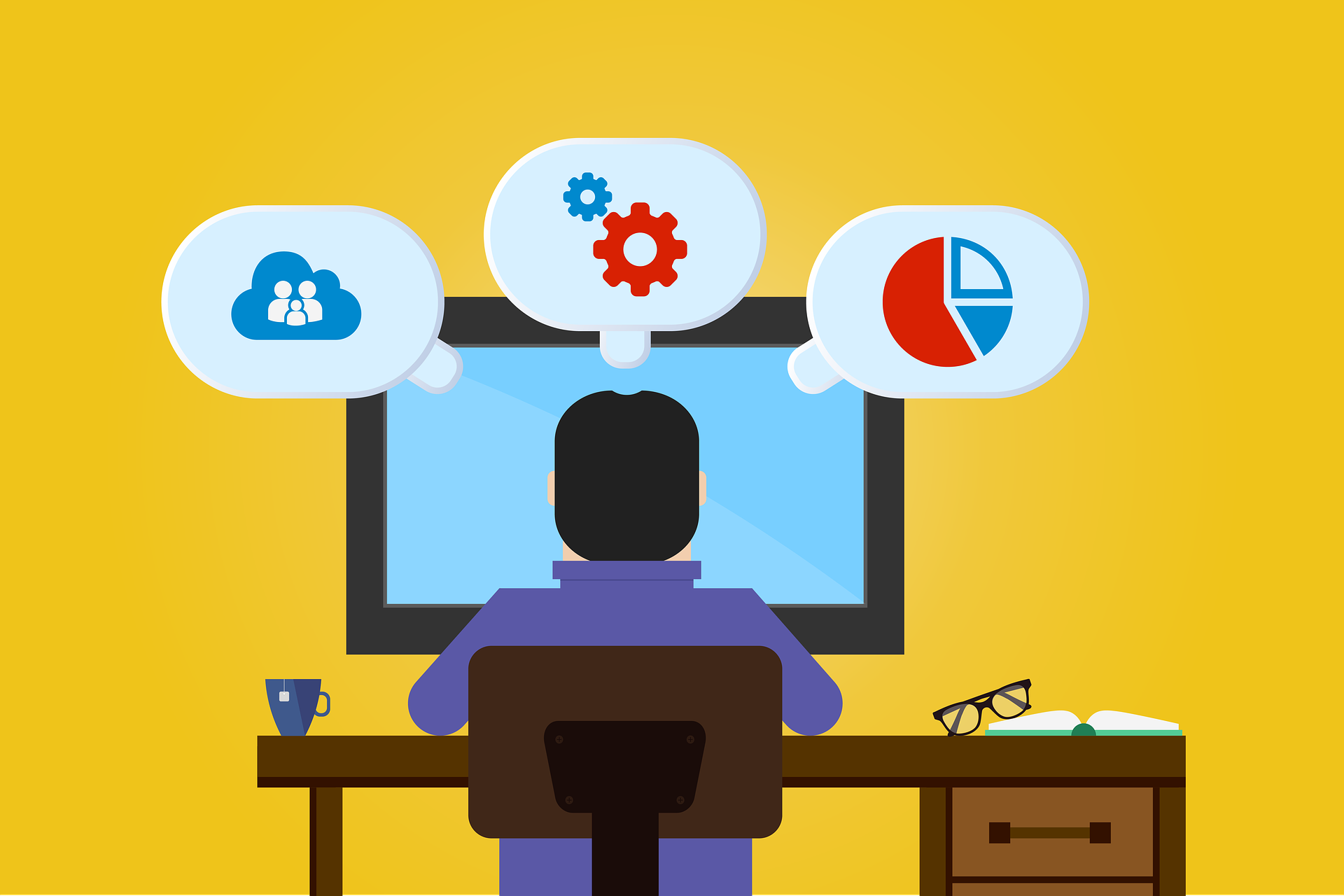
How Does it Differ from Other Developers?
Now, you may be wondering with that explanation, how does a software developer differ from something like a mobile app developer or a game developer. The quick answer is that they don’t. Mobile app developers, game developers, and similar are all technically software developers, as both mobile apps and games are software. So, depending on the context, all developers may in fact be grouped into this singular definition of software developers.
However, for the purposes of most everyday usage, the difference between them is specialization. As the names suggest, mobile app developers focus specifically on software for mobile devices, game developers focus specifically on software programs that can be defined as a game, and so forth. Meanwhile, when people talk about software developers and software, they’re usually talking about the numerous programs on computers that aren’t merely there for entertainment – like browsers, text processors, modeling programs like Blender, and similar. You can think of it more like the “serious” programs that are there to help us improve our lives.
So, in this case, most software developers are focused on the truest definition of tools and are usually those who make productivity-related tools for us to use day-to-day. That being said, this still covers an immense amount of program types, so there is a lot there for everyone!

What do Software Developers do every day?
With this base understanding of what a software developer is, it’s time to jump into what a developer actually does in terms of their day-to-day activities. Bear in mind, this will vary from company to company, software to software, and so forth. Nevertheless, we can break these duties down into four main sections, based on information from the U.S. Bureau of Labor Statistics.
Planning
Before you can develop software, a plan needs to be made (yes, regardless of the software you’re making. Generally, most software starts off as a problem someone wants to solve. For example, maybe there is a new music encoding format called .music and someone wants to make a music player that can actually play that file format. So, how does one go about solving this?
Well, this is where the software developer rolls up their sleeves and gets to work. They spearhead the project and help decide on the exact features of the software, how to actually implement those features, how to structure all the backend data to make the software function, and so forth. In essence, this activity can be considered where the software engineer is an architect. Much as you don’t build a house until the architect gets down all the technical aspects like where the walls go, window sizes, and so forth, you don’t build software until the developer decides on data structures and actual logic the software will need as a tool.
So, in this phase, software developers work with clients and help make this blueprint via documents and so forth so everyone involved in the production has the same map to work off of.

Execution
After the planning phase, comes the actual part where the software is built. For the software developer, this can mean one of two things.
In some cases, the software developer will directly sit around and write the actual code for the software – i.e. the instructions that give the software its functionality. As you can imagine, there is a lot of time spent on this process since writing code does take time – especially when you have a sufficiently complex piece of software being created.
However, in other cases, the software engineer may have a team of coders to work with. In these cases, there is usually a bit more hands-off approach, and while the software engineer may do some coding, they mostly oversee the coding others are doing and make sure that it is up to scratch with what was planned. Nevertheless, the software developer does still need to know how to code regardless, so it’s not a free pass to avoid the programming aspects.

Quality Assurance
Another key activity for the software developer is quality assurance. Now, there are several levels to this aspect that need to be gone over.
First, there is the actual testing. Obviously, if the software doesn’t work as intended, that’s not really solving the problem it was made to solve. So, a software developer of course wants to make sure it works. Additionally, a software engineer will also employ a variety of tools such as performance trackers and similar to make sure that their program is as efficient as possible and won’t have problems down the line.
Another aspect of quality assurance is bug fixing. Computer programming in itself is complicated, and the more complicated your software is, the more complicated the computer programming is. Thus, no matter how perfectly you might plan and execute, there will always be bugs and aspects that don’t work as you foresaw. So, during the execution – and really for the software’s entire lifetime – the software engineer will figure out how to fix these bugs and get the patches out to the consumers.
Last, quality assurance also involves a bit of data analysis. Depending on the situation, many companies will collect data from users to ensure the software is meeting their needs. This data might contain information about how easy it is to use the UI, desired features, and so forth. So, the software developer may be involved with checking this data so that they can continue to improve the software.
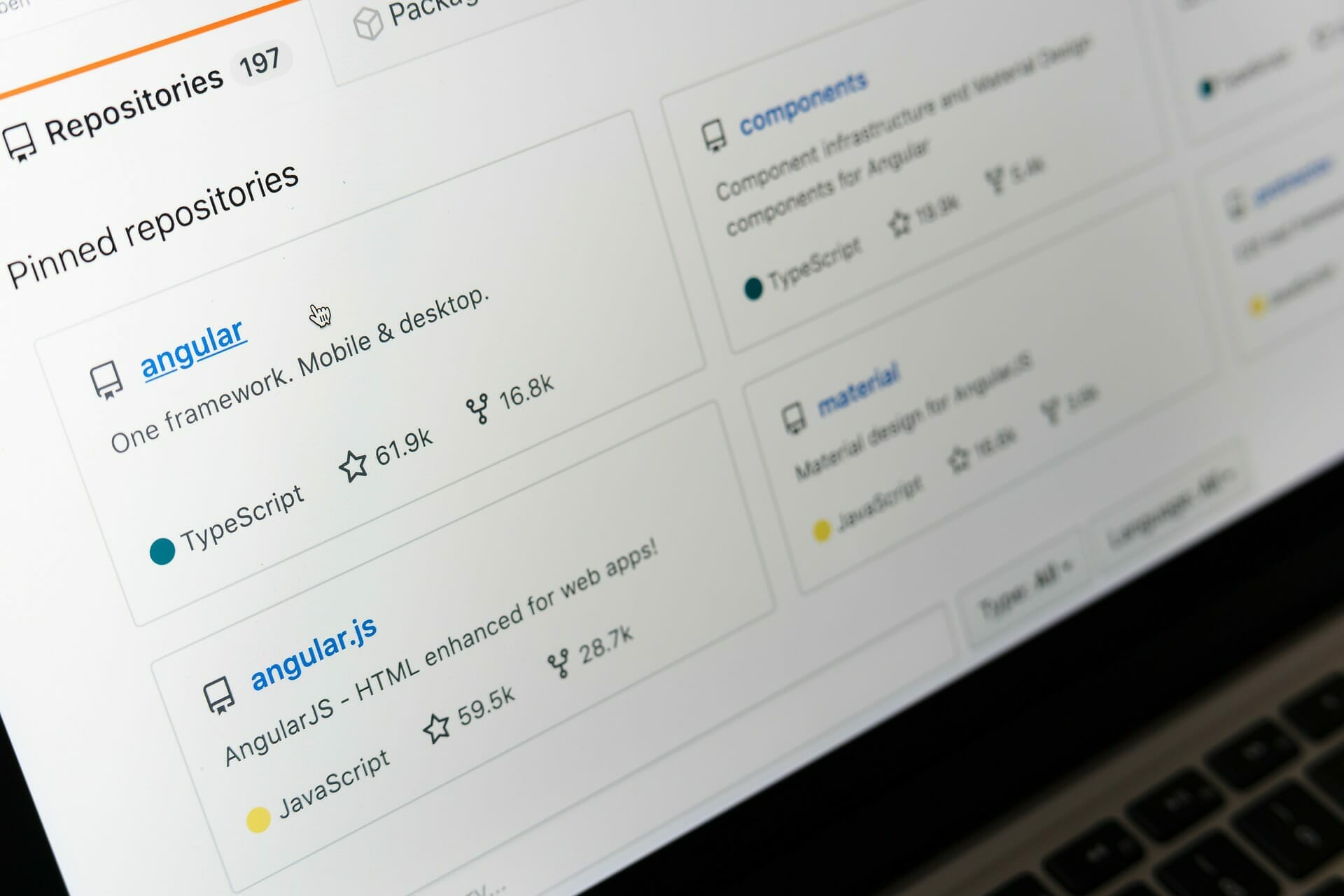
Documentation and Collaboration
The final main activity of the software developer is documentation and collaboration.
While some software developers work solo, many others wind up working in teams. Even then, solo developers may eventually move on to different projects and let other software developers take over the project. However, in both cases, if no one understands how the software works, they’re going to have a time implementing anything else with the software.
As such, software developers also spend a lot of time documenting the process and software itself. In so doing, not only can everyone on the team be on the same page about the software, but new members won’t come in wondering what your code is even supposed to do.
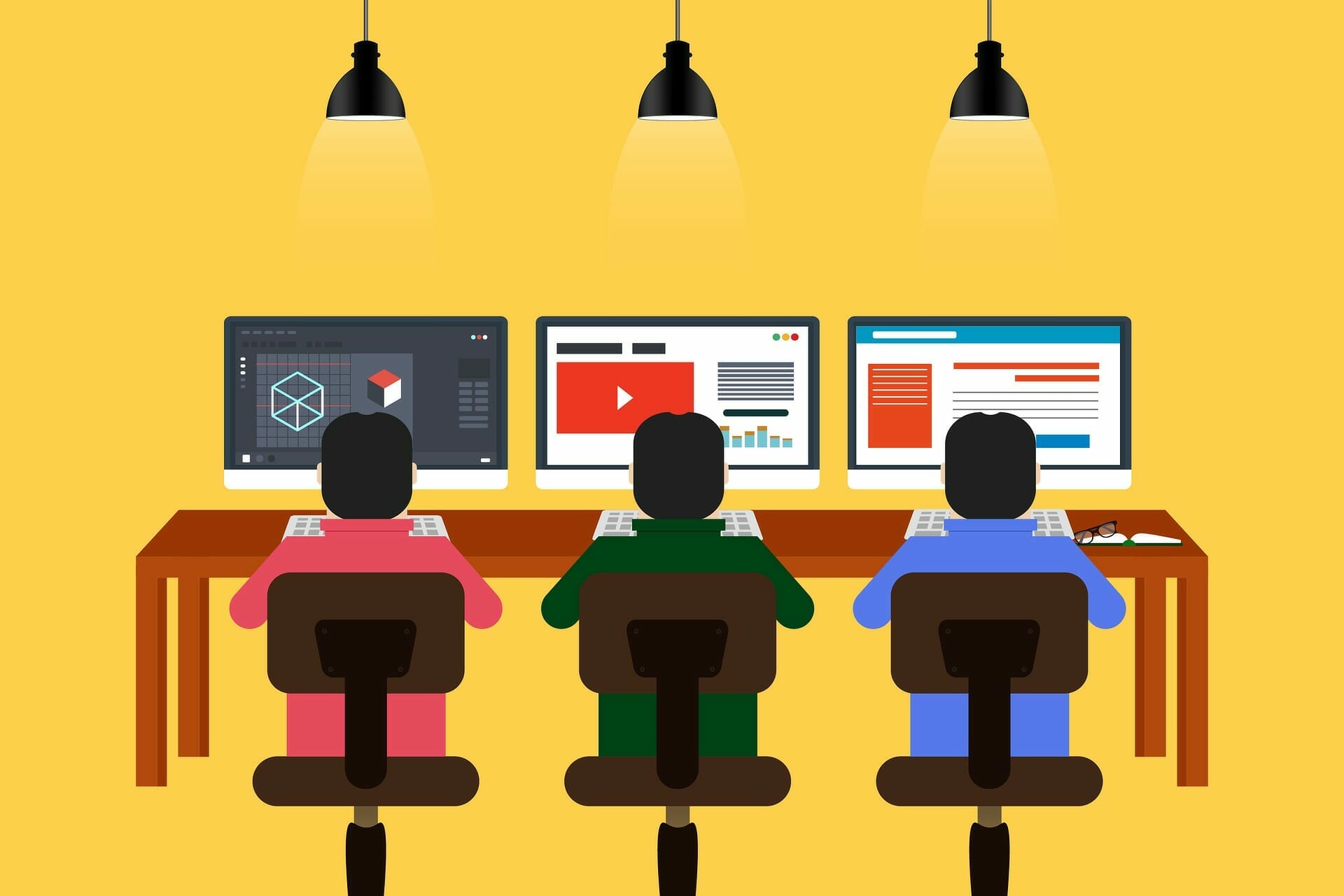
Are Software Developers In-Demand?
The next question on your list may be whether or not software developers are actually in-demand and if this is the right time for you to pursue this career.
According to the U.S. Bureau of Labor Statistics, there is an expected 22% job increase from 2019 to 2029 – meaning 300,000+ more jobs will be available for this field in just the U.S. alone. If you factor in other countries, this total is much higher.
It is also noteworthy that, via data research done by ncube in the U.S., graduate rates for STEM fields are not keeping up with the demand or current employee retirement. As such, by 2021 there was an estimated .4 million shortage of software developers for company hiring. This is an extreme contrast to other industries such as engineering, life sciences, and similar – where graduation rates are far exceeding job demand.
Even outside the U.S., Medium cites research that shows software developers are, in fact, the most in-demand profession right now globally. So, long story short, absolutely! Software developers are in extremely high demand right now, and there has actually never been a better time to jump into the ring.
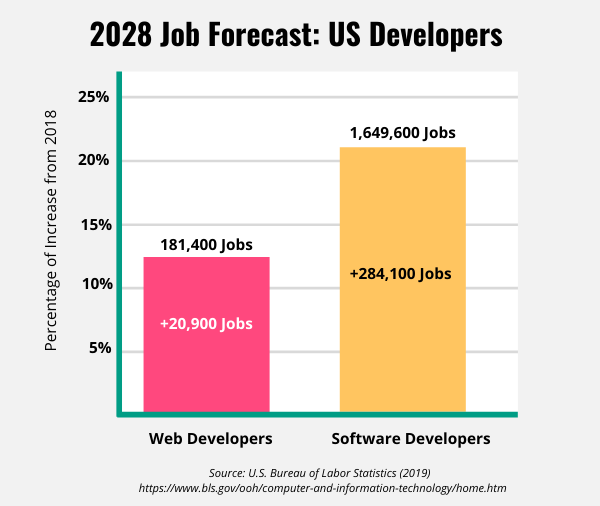
What is a Software Developer’s Salary?
Let’s move on to the topic of compensation – i.e. how much you can actually earn as a software developer. Disregarding factors such as company, location, and similar, the following companies listed the averages per year below for software developers in the U.S.:
- ZipRecruiter: $86,523
- Glassdoor: $76,526
- Economic Research Institute: $105,655
- PayScale: $71,958
- Indeed: $107,914
- U.S. News: $107,510
- CareerExplorer: $92,824
- SimplyHired: $113,252
To get a better estimate, we can average all sources above to wind up with a total average of $95,270. Either way, though, software engineers have strong negotiating power for high salaries, and the more skills you gain or specialize in, the more competitive you’ll be for the field! This is why you see such a discrepancy in, as the best software developers have the technical skills, computer science knowledge, and experience with computer software to leverage higher pay int he software industry.
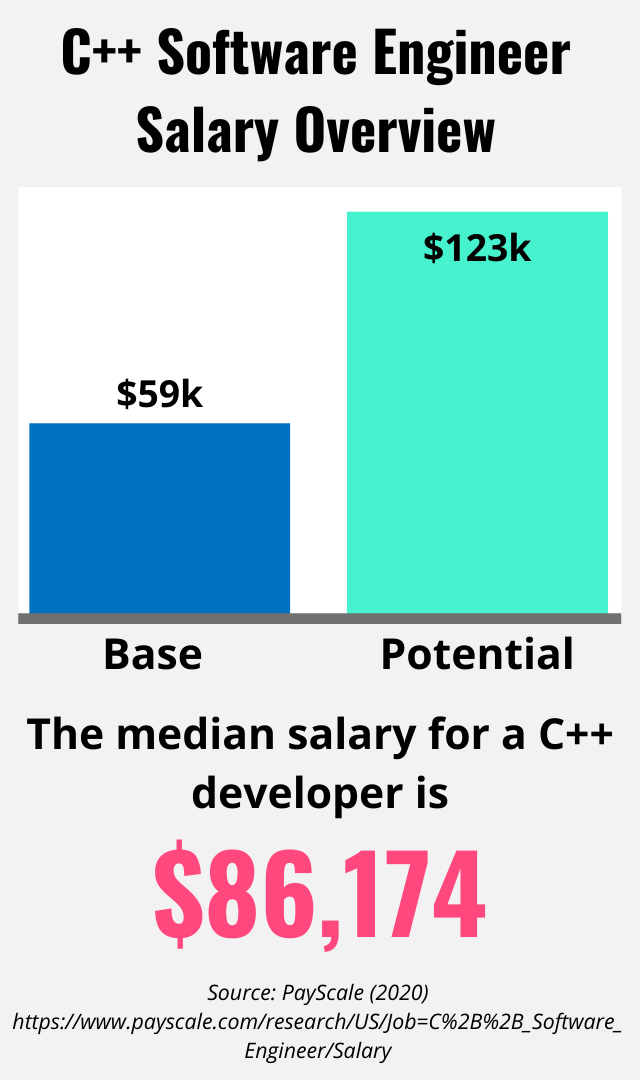
What are the Required Skills for a Software Developer?
Maybe by this point, you think the idea of software development sounds appealing! However, as with any career, understanding the skills you’ll need to become a successful software developer is important. While skills will vary from company to company, these are some universal ones you’ll need to learn in order to take this step in your career.
- Strong problem-solving skills: As mentioned, software is generally about solving problems – both big and small. Thus, having skills to take a problem and come to a solution is extremely important in this field.
- Knowledge of computer science: It should come as no surprise that understanding computer architecture and computer science is important. Not only can this knowledge affect the speed of the programs you make, but it can have important implications for how you program in general. Software, in particular, is affected greatly by this skill, so the more you know about computer science, the better position you will be in.
- Skills in data analysis: A lot of software development is about looking at data and understanding it – whether that be being able to read testing tools or being able to aggregate user feedback. As such, the ability to analyze this sort of data will help out greatly when becoming a software developer.
- Communication and writing skills: Most software developers work for clients or in a team, so being able to communicate with those people is of monumental importance. Not only do you need to communicate what you’re doing with the software, but also be able to help others work with every aspect of the software you alter. The stronger your writing and communication skills are, the better software developer you will be.
- Programming Experience: Unsurprisingly, if a software developer wants to make software, they need to know how to program it. Knowing a programming language like C++, Java, C#, JavaScript, or any of the many others available is essential no matter what type of software you make or what you specialize in for software development.
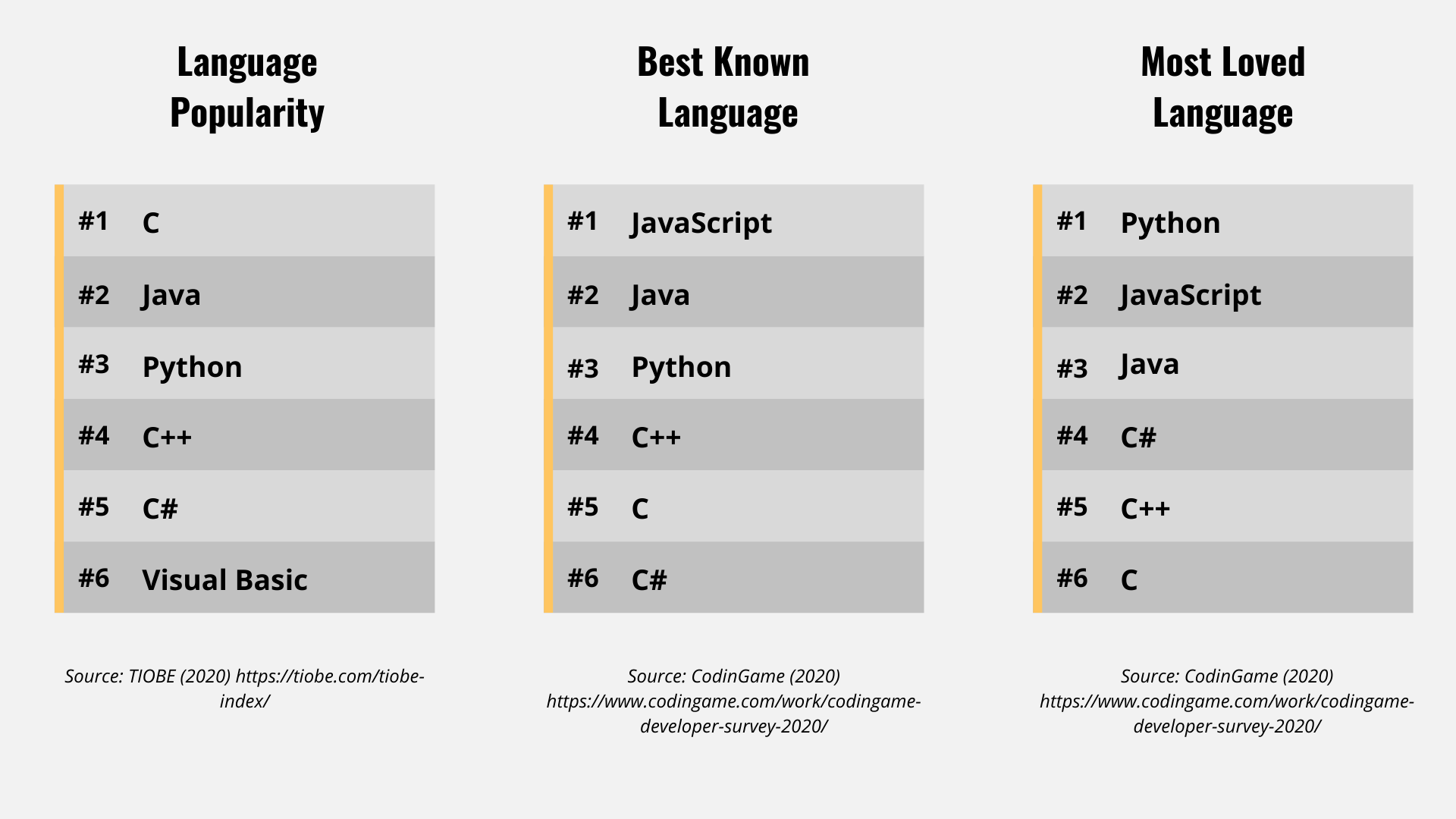
Software Developer Learning Resources
Have you decided if becoming a software developer is for you? If the answer is yes, we’re very excited for your new career prospects. However, before jumping into this new venture professionally, you’ll need to buckle down and learn some of the skills we’ve listed above. While formal education is great, the internet can also offer you a ton of resources from which you can gain the skills necessary to start your own software development portfolio.
If you’re ready for your first step, try some of our favorite resources below to get started on learning both programming languages and computer science.
Paid Resources
- Intro to Programming Bundle by Zenva
- C++ Programming Bundle by Zenva
- Java Foundations by Zenva
Free Resources
- Coding 101 Bundle – Programming Essentials by Zenva
- How to Build a Coding Portfolio by Daniel Buckley
- C# Programming for Human Beings by Allan Carlos Claudino Villa
- Software Design Patterns and Principles by TechLead
- An Entire Software Development Life Cycle by ForrestKnight
- C# Tutorial by Derek Banas
- C++ Programming All-in-One Tutorial Series by Caleb Curry
- Java Tutorial For Beginners by ProgrammingKnowledge
- What is Software Development by Technology Profession
- 3 years of Computer Science in 8 minutes by Devon Crawford
- How I Learned to Code – and Got a Job at Google! by CS Dojo
- Python Tutorial Series by Socratica
- Introduction To C# by Dani Krossing
- Let’s Learn C++ by Trevor Payne
- An Introduction to Software Design – With Python by Tech with Tim
- Python Project Create Real Software by Harshit vashisth
- C++ First Hello World Program by LearningLad
- Advanced Java for Beginners by Extern Code
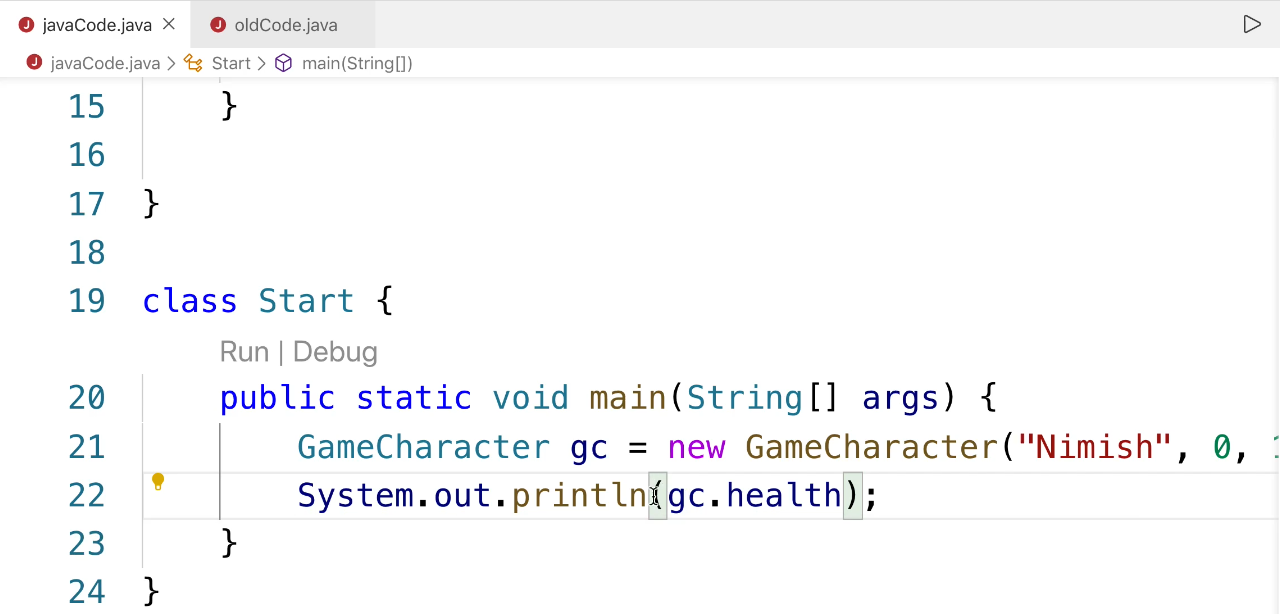
Conclusion
Becoming a software developer is a wonderful option if you’re so inclined for your career. Not only is this industry still growing at one of the highest rates comparatively, but salaries for software developers match this high-end demand. Plus, if you have the willingness to continue to develop your skills with industry changes, you can make yourself that much more competitive in the field. Plus, you can bet your money on the fact that STEM technology will continue to change and evolve, meaning that this is not a career that will die out anytime soon.
So, if you’re a problem solver, love to make systems, want to work with computers, or simply just want to try out a new path, you can’t go wrong with software development. There are almost too many opportunities available, but hopefully you can now step into the world with a better idea of the right path for you. Good luck, and we hope you find the career meant for you!




